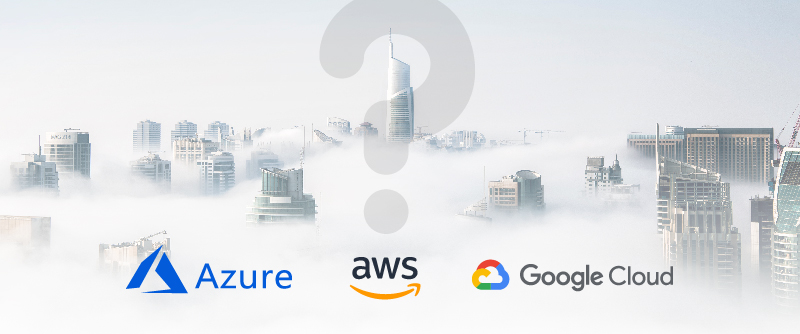In a multicloud world that is
dominated by the big three providers – Amazon Web Services, Google Cloud and
Microsoft Azure – why choose a single
Cloud provider when you can enjoy everything they offer?
Broader and
more varied products are increasingly made available to us, but they all are high quality services with excellent
availability, top-notch security and
high performance, so they are going to allow us to meet any need we might
have.
Of course, they differ in name,
price, technology and how they are grouped within each platform. We are going
to compare the services of the big three public clouds to see which one is
better for us.

LIST OF CATEGORIES
Computing
Storage
Databases
Networks & Connectivity
Cloud management & control tools
Segurity
Developer tools
Big Data & Analytics
Machine learning and AI
IoT, Blockchain and others
Computing
A basic cloud service is
computing or processing capacity. All ‘big three’ offer different types of instances based both on Windows
and Linux, with GPUs or with big-size, high-performance configurations.
They each already have their own
managed Kubernetes and Serverless services. In the first case, Kubernetes Engine stands out because of its level of
readiness.
Lambda stands out in the second
case because of the same reason and also because it allows a bigger number of
languages to be used (Java, Go, PowerShell, Node.js, C#, Python, and Ruby).
Some of the most notable
computing services that have been launched recently are AWS Outposts, which
allows Amazon’s cloud technology to be used on the client’s premises (on-prem),
and GKE On-Prem, which allows Kubernetes Engine to be used in data centres.null
IaaS: deployment, management and maintenance of virtual servers
AWS
AZURE
GCP
Platform-as-a-Service
AWS
AZURE
GCP
Virtual private servers
AWS
AZURE
GCP
Managed container service
AWS
AZURE
GCP
-
Managed Kubernetes service
AWS
AZURE
GCP
Docker container logging
AWS
AZURE
GCP
Serverless containers, without cluster or server management
AWS
AZURE
GCP
A managed service for deploying and orchestrating microservice-based applications
AWS
AZURE
GCP
Serverless
AWS
AZURE
GCP
Batch computing
AWS
AZURE
GCP
Automatic instance escalation
AWS
AZURE
GCP
Local cloud infrastructure
AWS
AZURE
GCP
Storage
Another essential cloud
functionality is storage capacity. Given that it pioneered S3 (Single Storage Service), AWS is the best known
out of the three cloud providers, but all three provide a wide range of highly
reliable services that cover all storage types: object-based, filed-based, disks for instances, backup, etc.
All three have services for uploading
large volumes of data to the cloud, where devices are sent to the premises of
the client in order for it to copy its data therein and then return said
devices to the data centre in order for the data to be uploaded faster and with
added security.
The biggest, most spectacular of
these services is Snowmobile, where an Amazon truck measuring almost 20m in
length drives to all of the client’s premises for the data. On the other hand, the only service with disaster recovery capabilities is
Microsoft Azure.
Although it depends on the type
of storage, the amount of stored data and the region, as a general rule it can
be said that Azure’s services are cheaper than Google Cloud’s, and that Google
Cloud’s services are cheaper than AWS’.
Object storage
AWS
AZURE
GCP
Storage for archiving
AWS
AZURE
GCP
Disk for instances
AWS
AZURE
GCP
File storage
AWS
AZURE
GCP
Solutions for uploading large amounts of data to the cloud
AWS
AZURE
GCP
Backup
AWS
AZURE
GCP
Hybrid storage
AWS
AZURE
GCP
Disaster Recovery
AWS
AZURE
GCP
Databases
Naturally, the range of databases
that are available on the cloud is quite wide: relational databases, NoSQL, caches, data warehouses, etc.
The only relational database
engines supported by Google Cloud are MySQL and PostgreSQL. In addition to
these two, Azure supports MariaDB and SqlServer, whereas AWS supports Oracle on
top of all of the former.
Google Cloud stands out in
particular because of BigQuery.
Only Azure and AWS provide graph-
and service-based databases for migrating and replicating databases.
Relational databases
AWS
AZURE
GCP
NoSQL: document storage
AWS
AZURE
GCP
NoSQL: key-value storage
AWS
AZURE
GCP
Cache Storage
AWS
AZURE
GCP
Database migration
AWS
AZURE
GCP
Managed Data warehouse
AWS
AZURE
GCP
Graph databases
AWS
AZURE
GCP
Networks & connectivity
This is one of the categories where all three providers are more or less on a par. There are, however, significant differences in the technologies each provider uses or how they meet every need.
But all three of them allow us to manage the networks in our infrastructure from the cloud, create subnetworks, use load balancers, perform NAT, set up a firewall, create a VPN, set up dedicated connections with a corporate data centre and create a CDN.
Isolated virtual network environments
AWS
AZURE
GCP
Connection with on-prem environments
AWS
AZURE
GCP
Administered DNS for managing names and records
AWS
AZURE
GCP
Redirection of incoming traffic to improve performance and reliability
AWS
AZURE
GCP
Global content delivery network
AWS
AZURE
GCP
Dedicated, private network for connecting the cloud and local environments
AWS
AZURE
GCP
Load balancing: incoming traffic is automatically distributed
AWS
AZURE
GCP
Cloud management and control tools
This section includes a few
utilities that facilitate monitoring, billing, traceability, managing the
infrastructure as code and applying good practices.
These are functionalities that
provide the other services with more cohesion and allow each Cloud to behave
like a platform.
Cloud consultancy capabilities
AWS
AZURE
GCP
Resource procurement and orchestration
AWS
AZURE
GCP
- Cloud Deployment Manager
Cloud resource monitoring and administration
AWS
AZURE
GCP
Billing
AWS
AZURE
GCP
Administration
AWS
AZURE
GCP
User activity and API usage monitoring
AWS
AZURE
GCP
Evaluation of the status of workloads compared to AWS-recommended architecture-related practices
AWS
AZURE
GCP
Security
When these providers say they
offer better security than that which can be achieved on the premises, they do
it based on all the time, effort and money they have invested in their own
physical and logical security.
They put this investment at the
service of their clients’ in each of their products. Furthermore, they provide
a series of additional services for setting up the security of our applications
and data according to our needs and the level of security we desire.
Identities are managed via IAM
and, even though Google Cloud and Microsoft Azure are strongly focused from a
native point of view on G Suite and Active Directory respectively, all three
providers provide mulit-platform integration solutions.
With Google Cloud’s recent addition
– Cloud Armor, all three providers now provide a DDoS attack protection
service.
Authentication & authorisation
AWS
AZURE
GCP
Information protection
AWS
AZURE
GCP
Encryption
AWS
AZURE
GCP
Firewall
AWS
AZURE
GCP
Security assessment
AWS
AZURE
GCP
Certificate administration
AWS
AZURE
GCP
Directory services
AWS
AZURE
GCP
Identity administration
AWS
AZURE
GCP
Multi-factor authentication
AWS
AZURE
GCP
Threat and anomalous activity detection
AWS
AZURE
GCP
Regulatory compliance
AWS
AZURE
GCP
Protection against DDoS attacks
AWS
AZURE
GCP
Developer tools
Today we have all the necessary
tools to build, deploy, diagnose, debug and manage all kinds of scalable services
and applications in multi-platform mode.
This broad and varied range of
services seem to be aimed at encouraging us to make the cloud our development
environment. They range from the most typical
(code repositories, construction tools, deployment managers) to the most
specific (queuing, messaging, API management or search engine services).
As of today, all three providers
have their own service mesh infrastructure layer available. Curiously enough, Google Cloud does not have an email messaging service
integrated in its platform and instead proposes using the services from third
parties.
Video streaming services, including diverse transcoding technologies
AWS
AZURE
GCP
Creation and optimization of workflows among applications, data and devices anywhere
AWS
AZURE
GCP
API Management
AWS
AZURE
GCP
Testing of applications in devices
AWS
AZURE
GCP
Git Repositories
AWS
AZURE
GCP
Building of applications and artefacts
AWS
AZURE
GCP
Command line interface
AWS
AZURE
GCP
Predefined templates
AWS
AZURE
GCP
Code repositories
AWS
AZURE
GCP
Application deployment
AWS
AZURE
GCP
Collection of application development tools
AWS
AZURE
GCP
Collection of application development tools
AWS
AZURE
GCP
Mobile app analysis
AWS
AZURE
GCP
Email services
AWS
AZURE
GCP
-
Queuing services
AWS
AZURE
GCP
Managed Apache MQ service
AWS
AZURE
GCP
-
Notification services
AWS
AZURE
GCP
Payment services
AWS
AZURE
GCP
Implementation of backend processes by connecting applications, data and devices locally or on the cloud
AWS
AZURE
GCP
Service mesh
AWS
AZURE
GCP
Apache Lucene-based scalable search service
AWS
AZURE
GCP
-
Administered search service
AWS
AZURE
GCP
Big Data & Analytics
On-demand usage – one of the
cloud’s main characteristics – is of particular relevance here. How much money should we invest to deploy a Hadoop or Spark cluster?
All three platforms provide
managed services that allow us to turn on the cluster when we are going to use
it and to turn it off when we do not need it.
And, besides that, they provide
tools for data streaming, orchestration, display and so on.
A Hadoop- and/or Apache Spark-based platform for analysing large amounts of data
AWS
AZURE
GCP
Data stream ingestion and processing platforms
AWS
AZURE
GCP
Data Streaming
AWS
AZURE
GCP
A managed service for storing business data and looking them up by means of standard SQL
AWS
AZURE
GCP
Data workflow orchestration
AWS
AZURE
GCP
Display
AWS
AZURE
GCP
Machine Learning & AI
This is probably the category
which more services have been added to and has grown the most in the past few
years.
Apart from managed services, many
easy-and-ready-to-use services have been added. Google Cloud’s APIs stand out
because of their readiness level.
A machine learning managed service
AWS
AZURE
GCP
Voice recognition and conversation UI
AWS
AZURE
GCP
Text-to-voice
AWS
AZURE
GCP
Vision
AWS
AZURE
GCP
Natural language processing
AWS
AZURE
GCP
Translation
AWS
AZURE
GCP
Video
AWS
AZURE
GCP
Personal assistant services
AWS
AZURE
GCP
An automated ML service
AWS
AZURE
GCP
IoT, Blockchain and others
All three providers have their own IoT platform (this particular battle has not been won yet) and marketplace. Apart from this, they provide gaming, VR and AR services.
The blockchain services AWS has launched are particularly interesting because they keep you isolated from the difficulties of setting up your own network.
IoT
A service for connecting and supervising IoT devices
AWS
AZURE
GCP
A managed service for providing devices with edge computing capabilities
AWS
AZURE
GCP
Remote device administration
AWS
AZURE
GCP
Event detection and response
AWS
AZURE
GCP
Blockchain
A managed service for creating Hyperledger Fabric- and Ethereum-based scalable blockchain networks
AWS
AZURE
GCP
-
A fully administered accounting database providing a transparent, immutable transaction ledger that can be verified by encryption
AWS
AZURE
GCP
Others
A marketplace open to third-party products and services
AWS
AZURE
GCP
A comprehensive communication, email and document business suite
AWS
AZURE
GCP
Managed services for hosting gaming servers
AWS
AZURE
GCP
A game engine
AWS
AZURE
GCP
-
Augmented reality and virtual reality services
AWS
AZURE
GCP
Comments are moderated and will only be visible if they add to the discussion in a constructive way. If you disagree with a point, please, be polite.





Tell us what you think.